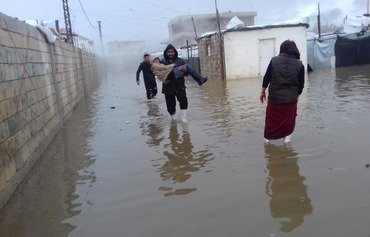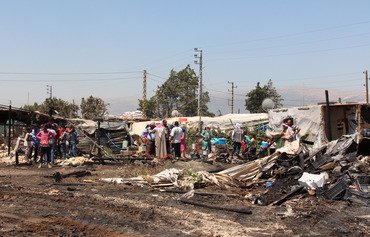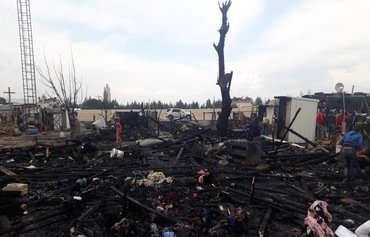As soon as the fires that ripped through two Syrian refugee camps in Qab Elias and Bar Elias in Lebanon's Bekaa Valley were extinguished, a construction workshop sprang up to rebuild the tents destroyed in the blaze.
By July 7th, Syrian refugees displaced by the July 4th fires had begun to return, while other families are still sheltering in temporary tents set up by the Lebanese Red Cross until their new tents are ready.
A 7-year-old girl died and seven people were injured in the fire near Bar Elias, while a blaze near Qab Elias on July 2nd killed one person and wounded six.
The Bar Elias fire, likely caused by a gas explosion inside a tent, destroyed 22 of the camp's 185 tents, according to Lebanon’s civil defence service.
![Syrian refugee children play next to the new tents set up by crews from local and international organisations after more than 200 tents were destroyed by fire in two Bekaa Valley refugee camps. [Nohad Topalian/Al-Mashareq]](/cnmi_am/images/2017/07/26/8934-syria-camp-fire-600_384.jpg)
Syrian refugee children play next to the new tents set up by crews from local and international organisations after more than 200 tents were destroyed by fire in two Bekaa Valley refugee camps. [Nohad Topalian/Al-Mashareq]
In Qab Elias, fire destroyed all but three of the camp's 193 tents.
A total of 106 new tents have since been constructed, and water and sewage infrastructure has been put in place at the sites of the fire.
The construction site was bustling with activity on a recent workday, as crews from local and international organisations worked alongside the Syrian refugees to complete the remaining work.
Many others have pitched in to help on a voluntary basis, including local residents of Qab Elias and Bar Elias, the local municipalities, the civil defence, and a large number of civil society organisations.
These groups have been co-ordinating their work under the supervision of the Ministry of Social Affairs.
Others contributing to the rebuilding effort include the UN High Commissioner for Refugees, UNICEF, Save the Children, the Union of Relief and Development Associations, Beyond, Abaad, the Nabad Association for Development and Sawa for Development and Aid.
The municipalities of the two towns have removed the rubble left by the fire and spread limestone powder on the ground where the tents once stood after cleaning up the sites, while the participating organisations built wooden frames for the tents after pouring in cement slabs as flooring.
Refugees take part in rebuilding effort
Some refugees have joined in with the rebuilding effort, among them al-Raqa native Mustafa Mohammed al-Mahmoud, 34.
As he worked on a canvas awning, al-Mahmoud told Al-Mashareq he has been helping out, even though he suffered burns to his feet as he attempted to save a child from a tent in flames and evacuate others from the scene.
"Despite the constant pain in my feet, I am taking part in rebuilding the burned down tents, including mine," he said. "It is my duty as a human being to do this, for we are the ones who will live in these tents."
"Our Lebanese brothers helped us during this calamity that has befallen us," he added. "They gave us a helping hand, after having taken us in. They have not failed us."
Another al-Raqa native, 25-year-old Nadia al-Mousa, told Al-Mashareq she is waiting for her tent in Qab Elias camp to be rebuilt so she can return to it with her six children, one of whom is a baby, and her parents.
"We have nothing left, but the support we received from the residents, associations and organisations alleviated our agony and sorrow," she said.
Al-Mousa said she is waiting for a new shipment of canvas awnings to arrive "to attach to the wooden structure of our tent to shield us from the summer heat".
Other forms of support for the afflicted
Not far from the noise of the workshop, the sound of laughter could be heard. Inside a large tent set up by the Beyond association, children played after undergoing a post-fire psychological support session.
A team from Beyond helped with the firefighting efforts, and later provided a medical team to provide check-ups for refugees experiencing symptoms of smoke-inhalation in donated tents that can accommodate 300 children.
Beyond also has helped to build new tents, and is providing psycho-social support for camp residents, with backing from UNICEF and help from KAFA, Beyond executive director Maria Khayat Assi told Al-Mashareq.
The ongoing programme aims to restore hope to the refugees and help their children overcome the psychological trauma caused by the fire, she said.
The rebuilding of the tents "elicited unprecedented humanitarian solidarity with the refugees, which resulted in the tents being rebuilt at record speed", said UNHCR communication officer and tent building supervisor Tatiana Audi.
The various entities taking part in the rebuilding effort "worked in wonderful co-ordination to remove the rubble and build the new tents", she told Al-Mashareq.
The UNHCR provided lumber and canvas awnings to the refugees via Save the Children, and its team helped build the tents and distribute in-kind assistance, she said.
The UNHCR also "issued new legal documents to affected refugees to replace those that were lost in the fire", she added.
Minister of State for Refugee Affairs Moein al-Merehbi described the swift, collaborative reconstruction efforts as "wonderful and humanitarian".
"Just as they threw themselves into the fire to save the refugees, they rushed to build their tents," he told Al-Mashareq.

![Members of the Beyond organisation offer children a post-fire psychological support session in a Bekaa Valley tent set up after two fires ravaged local refugee camps. [Photo courtesy of Beyond]](/cnmi_am/images/2017/07/26/8881-Lebanon-Beyond-tent-600_384.jpg)






